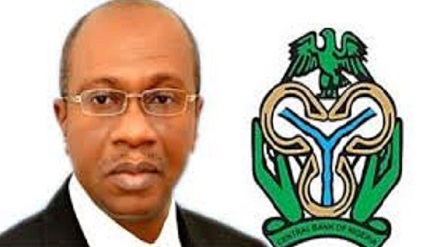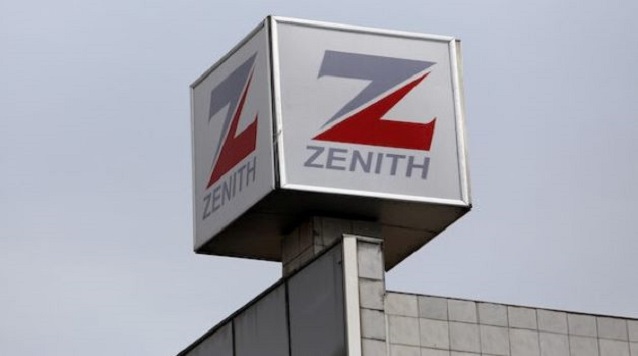E-Financial
CBN Blames Sanusi, Soludo for Forex Crisis

Mr. Godwin Emefiele, governor of the Central Bank of Nigeria (CBN), has blamed Lamido Sanusi and Professor Chukwuma Soludo- his predecessors for the current foreign exchange crisis in the country.
Emefiele said the current forex crisis would have been averted if Soludo and Sanusi had not adopted measures that resulted in the depletion of the country’s foreign reserves, according to a report in National Mirror.
Soludo was CBN governor between 2004 and 2009 when Sanusi succeeded him.
According to Emefiele, when both men were at the helm of affairs at the apex bank, the price of oil was consistently well above $110 per barrel and the country had healthy reserves that would have allowed it to invest in critical infrastructure that would boost productivity and diversify the economy.
He said: “In September 2008, Nigeria’s FX reserve stood at $62 billion, what did we do with $62 billion? At a time when crude oil price was at about N120 per barrel, what did the country do? What we could have done is save the money. If we couldn’t save the money, invest it in infrastructure, invest in industry; invest them in infrastructure and industry that would grow productivity and the wealth of our people.
But what did we do? “I’ll give you an example. The Central Bank of Nigeria of that time went about licensing class ‘A’, class ‘B’, class ‘C’ bureaux de- change. “For class ‘A’ bureaux de- change, Central Bank was allocating $1 million per week; for class ‘B’ bureaux de- change, Central Bank was allocating $750,000 bureaux de- change to the extent that between 2005 when the bank started selling dollar cash and 2016 January when we stopped it, the CBN had sold dollar cash of up to $66 billion to BDCs.
“In 11 years, CBN allocated $66 billion, averaging $6 billion per year. If this didn’t happen, we would comfortably be having well over $90 billion in our reserve account today and we will not be struggling to pay our bills today. If we had thought of other ways to utilise our reserves in 2008 when it was as high as $62 billion, perhaps certainly we would not be where we are.”
He revealed that when he was CEO of Zenith Bank, he was queried by a Deputy Governor of the CBN for not selling dollars to BDCs. “I was called to be queried that some people in Kano, some people in Port Harcourt and in Lagos were calling to say Zenith Bank was not selling dollar cash to bureaux-de change, but of course the bank didn’t see any serious need to disburse dollar cash to bureaux-de-change at that time.
That was what we did with part of our $62 billion,” he stated. Besides, he said in the wake of the global financial crisis, all forms of capital control were removed to encourage the flow of capital into Nigeria with the result that between 2009 and 2014, the country recorded $23 billion in capital flows.
However, according to him, although CBN’s policies at the time encouraged Nigerians to buy shares/securities abroad, there was no record that the dividends and proceeds of sale of the shares were repatriated through the apex bank.
He said: “Between 2009 or 2010 and 2014, when we had the crisis, America pumped a lot of money to stimulate the economy, and as a result of pumping that money, some of those funds flowed into emerging markets, including Nigeria.
At that time again, Nigeria removed all forms of capital control to encourage the flow of capital into Nigeria. So what happened during that time? In five straight years, we saw crude price at above $105 per barrel for five straight years.
“That period, we also saw unhindered flow of capital into emerging market into Nigeria; to the extent that by 2013, we had $23 billion in capital flows into Nigeria. What did we also do? The CBN started encouraging Nigerians to buy shares/ securities abroad.
Although the dividends and proceeds of sale of the shares were to be repatriated through the CBN, we do not have any records to show that the dividends and proceeds of share sale were repatriated. People just had all the discretion to transfer funds as they wished; just because we thought we had a lot and didn’t think about a day like today when crude prices will be so low.
We should have, at that time, built our reserves. What did we do with our reserves at that time? I repeat those were some of the actions we took as Central Bank that resulted in the situation that we are today.” The CBN Governor, who stoutly defended the regulator’s forex policy, especially the forex ban on 41 items, said that the country could not afford to be importing items it has the capacity to manufacture, stressing that the forex ban had already led to the creation of jobs in some sectors.
Commenting on the strategies that can get the country out of the economic recession, Emefiele again, suggested that the government sell assets in the oil industry just as Africa’s richest man, Aliko Dangote, suggested. ‘
He said: “In April 2015, I granted an interview to Financial Times of London where I suggested that in order to raise money to fund its capital expenditure, government needed to sell between 10 per cent and 15 per cent of its oil and gas assets.
At that time, oil price was about $50/N55 per barrel, and our consultants did the numbers and told us that we could raise between $25 to $35 billion.
I would imagine that that option is still on the table because more people even in the cabinet have made the same suggestion and if it happens, that will be fine, including the option to buy back the assets at some premium if we contemplate buying back when the crude prices move up and the assets value also move up.
You know that in government, there are those against and those in favour. The argument in favour of selling the assets has gained a lot of credence recently.” The country’s foreign reserves stood at $24.87 billion as at September 15.
E-Financial
Zenith Bank Gets Regulatory Approval for Full Takeover of Paramount Bank

Zenith Bank, Nigeria’s second biggest lender by market value, has received approval from the Competition Authority of Kenya (CAK) to acquire 100 percent of Paramount Bank Limited, clearing a key regulatory hurdle in its East African expansion drive.

In a statement on Thursday, CAK said the transaction is “unlikely to lead to a substantial prevention or lessening of competition in the market for the provision of banking services in Kenya” and would strengthen Paramount’s financial position, helping it meet enhanced core capital requirements over the long term.
The Kenyan regulator noted that the deal poses no risk of reduced competition in the country’s banking sector. Zenith currently has no banking operations in Kenya, while Paramount is a Tier III lender with a modest 0.2 percent market share.
“The approval is based on the Authority’s determination that the transaction is unlikely to harm competition, while any negative public interest concerns regarding employment can be addressed through mitigating remedies,” CAK added.
Paramount met the Central Bank of Kenya’s KSh3.0 billion core capital requirement in November last year, reporting KSh3.118 billion after raising KSh332 million from shareholders, according to Mwango Capital, a Nairobi-based research firm.
The deal reflects a broader shift among banks in East Africa’s largest economy as lenders seek growth opportunities beyond increasingly saturated home markets marked by weak credit expansion, rising regulatory costs, and intense competition.
While several global banks — including Standard Chartered and HSBC — have scaled back African operations over the past decade, Zenith’s move signals confidence in selective regional expansion, particularly in East Africa, where economic growth and financial inclusion trends remain supportive.
The banking group is also widening its continental footprint. Last month, the lender disclosed plans to expand into Ethiopia, Africa’s second most populous country, as it targets generating up to half of its profits outside Nigeria over the medium term.
Historically, Nigeria, the continent most populous nation contributed as much as 90 percent of the bank’s earnings, a dominance that is now gradually easing.
Data cited by The Africa Report show that profit contributions from foreign subsidiaries rose to 27 percent in the first nine months of 2025, up from 14 percent in 2024.
Nigeria’s banking recapitalisation drive is also pushing large lenders such as Zenith to deploy capital beyond their home market. In January 2025, Zenith — which holds an international banking licence — raised N350.4 billion ($242 million), lifting its paid-up capital to N614.6 billion ($425 million).
With higher capital buffers in place, banks are reassessing how best to deploy fresh funds as domestic earnings normalise following two years of windfall gains.
As part of the approval, Zenith has been required to retain Paramount’s 78 employees for at least 12 months after the transaction is completed.
The bank is listed on the Nigerian and London stock exchanges and operates across corporate, commercial, retail, and investment banking. Its international subsidiaries span the United Kingdom, Ghana, Sierra Leone, Gambia, the UAE, and China.
E-Financial
Court Jails Ogiemwonyi, Stockbroker for Theft of $80,000, N953m Shares Proceeds

Victor Ogiemwonyi, a Lagos stockbroker, and Partnership Securities Limited, his company, have been convicted for allegedly stealing shares worth N953 million and $80,000 belonging to one Mr. Arnold Onyekwere Ekpe, a former managing director of Ecobank Transnational Incorporated (ETI).

Ogiemwonyi was convicted after he was found guilty of two-count charges bordering on stealing, contrary to Section 285(1), (9) (b) and (c) of the Criminal Law of Lagos State, 2011 slammed on him by the Economic and Financial Crimes Commission (EFCC).
Ekpe, through Messrs Margaret Onyema, his counsel, has sometimes in October 2016 in a petition to the EFCC alleged that he instructed the defendants to sell his 96,077,872 units of Ecobank Transnational Incorporated (ETI) shares, which were sold at the rate of N1,296,885,311.02.
But he said out of the proceeds of the sale, the stock broker paid only N300,000,000.00 to him while he dishonestly diverted the balance for personal use.
Following investigations, the defendants were charged with two counts of stealing.
Count one reads:
”Victor Ogiemwonyi and Partnership Securities Limited between the months of June, 2016 and September, 2016 at Lagos within the jurisdiction of this honourable court dishonestly stole the sum of N953, 535,861.57 (Nine Hundred and Fifty Three Million, Five Hundred and Thirty Five Thousand, Eight Hundred and Sixty one Naira Fifty Seven Kobo) being part of the proceeds of sale of 96, 077, 872 Ecobank Transnational Incorporated Shares, property of Mr. Arnold Onyekwere Ekpe”.
Count Two reads:
“Victor Qgiemwonyi and Partnership Securities Limited sometime between June, 2016 and July, 2016 at Lagos within the jurisdiction of this honourable court dishonestly stole the sum of USD$80,000.00 (Eighty Thousand United States of America Dollars) which formed part of the accrued dividends on 96, 077,872 Ecobank Transnational incorporated Shares, property of Mr. Anold Onyekwere Ekpe”.
At trial, the prosecution, led by Ola Sesan, called five witnesses and tendered 67 exhibits, all of which were admitted and marked by the court.
The defence, on its part, called three witnesses, including the first defendant.
Delivering judgment on Wednesday, Justice Modupe Nicole-Clay of the Lagos State High Court sitting in Ikeja, Lagos convicted Ogiemwonyi and his company, Partnership Securities Limited, guilty on all counts.
The court sentenced the first convict to pay a fine of N10 million, while the second convict was ordered to pay a fine of N20 million.
Also, the court directed the convicts to pay back the entire money stolen from the petitioner, both in naira and dollars.
Recall that Securities and Exchange Commission, SEC, had in 2017 banned Victor Ogiemwonyi, from operating in the capital market for life over alleged unprofessional conduct in the Nigerian capital market.
He was also banned for life from holding directorship position in any public company in Nigeria.
He was also ordered to pay a penalty of N100,000.
SEC said Ogiemwonyi was banned after he was found guilty of breaching Rule 1(iii) of the Code of Conduct for Capital Market Operators and Their Employees as contained in its Rules and Regulations made pursuant to the Investments and Securities Act 2007.
The ban also followed petition by EFCC to SEC accusing Ogiewonyi of misappropriation of about N1.24 billion, $80,000.00, stealing and dishonest conversion of proceeds of share sale belonging to an investor.
It was alleged that he used his company to dupe over 300 investors over N4.8 billion with Arnold Ekpe a former Managing Director of Ecobank Transnational Incorporated, ETI, being one of his victims.
E-Financial
FCCPC Delists Non-Compliant Digital Lenders Post-January 5 Deadline

Federal Competition and Consumer Protection Commission (FCCPC) has commenced enforcement actions against Digital Money Lending (DML) operators that failed to regularise their operations under the Digital, Electronic, Online and Non-Traditional Consumer Lending Regulations, 2025 (DEON Regulations).

FCCPC
The commission withdrew the conditionally approved status of non-compliant DML firms and removed them from its official register of approved digital lenders, effective immediately after the January 5 compliance deadline.
FCCPC Executive Vice Chairman and Chief Executive Officer, Mr Tunji Bello, announced the measures on Wednesday, emphasising their role in upholding regulatory standards and ensuring certainty in Nigeria’s digital lending sector.
Mr Bello stated that the compliance window provided under the DEON Regulations, which took effect on July 21, 2025, had closed, paving the way for fair, orderly and due process-driven enforcement.
He noted that the actions target persistent issues such as exploitative loan recovery tactics, data privacy breaches, harassment of borrowers and anti-competitive practices that have plagued the sector.
The DEON Regulations, issued on September 3, 2025, under the Federal Competition and Consumer Protection Act 2018, mandate all non-bank digital lenders to register, adhere to fair interest rates, ethical debt recovery and robust data protection measures.
Non-compliance now attracts severe penalties, including fines up to N100 million or one per cent of annual turnover, operational restrictions, app store delistings and potential director disqualifications for up to five years.
As of late 2025, the FCCPC had granted full approval to 438 digital lending companies, with recent data indicating over 521 firms now under regulatory scrutiny post-deadline.
The commission’s phased crackdown involves collaboration with the Central Bank of Nigeria, Google and Apple for account freezes and global app removals targeting unregistered platforms.
Industry watchers described the enforcement as a landmark move to sanitise Nigeria’s fast-expanding digital credit market, which has seen rising borrower complaints despite earlier 2022 interim guidelines.
The FCCPC reiterated its commitment to balancing innovation with consumer protection, urging affected operators to swiftly meet requirements for reinstatement.

 E-Business3 days ago
E-Business3 days agoFirm Detected a Scam Exploiting OpenAI’s Teamwork Features

 E-Financial3 days ago
E-Financial3 days agoMoMo PSB Expands Cross-Border Transfers Across Africa

 Broadcasting3 days ago
Broadcasting3 days agoDG NCC Tasks University Dons on Research Commercialization, IP Management to Build Global Competitive Ecosystems

 E-Financial3 days ago
E-Financial3 days agoBanks to Cut Fraud Response Times to Under 30 Minutes

 Telecom3 days ago
Telecom3 days agoFG Expands 3MTT Programme Across the Country

 News3 days ago
News3 days agoFirms Face Gaps Between AI Ambition and Execution

 Telecom3 days ago
Telecom3 days agoMTN Foundation Trains 2,000+ Young Nigerians in ICT for SME Growth

 General News3 days ago
General News3 days agoKuda Unlocks Instant Online Accounts for NGOs and Religious Bodies















